How to Get Acrylic Paint Out of Carpet in 4 Easy Steps (with Pictures)
-

- Last updated:
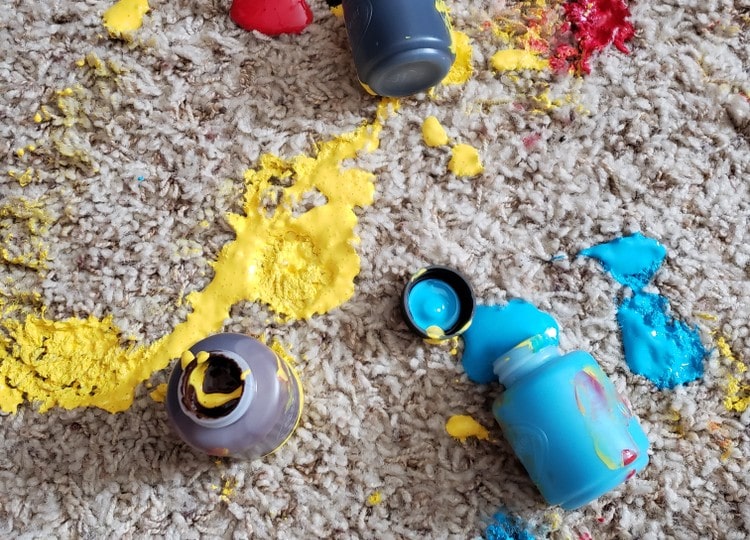
Safe and inexpensive, acrylic paint is a perfect medium to let your kids stretch their creativity. But like any paint, it can get everywhere during a lively art session, and if you’re not careful, that includes the carpet!
Few moments are more stressful than when you notice specks of paint in your otherwise pristine living room rug. You know that paint bonds fast to carpet fibers, so it may seem like any effort to remove it would be futile.
Fortunately, when you’re dealing with acrylic paint, a few simple cleaning techniques could be more effective than you realize. The next time a little carelessness causes a spill, follow these four easy steps to get acrylic paint out of the carpet.
Acrylic Paint Removal Materials
Acrylic paint is water-based, so it’s one of the easier paints to clean up. Oil-based paints require a thinner to remove them, but you generally only need water to pick up a fresh acrylic paint stain. The critical concern is getting to the paint before it dries, as drying will make it far more challenging to clean.
A thick layer of acrylic paint can take over an hour to dry, but a few minute dots or thin spreads will only take 10–30 minutes at most. If you accidentally drop a few dots of paint on your carpet, you need to act fast.
- Butter knife or similar scraper
- Spray bottle
- Mild dish liquid
- Water
- Paper towels or a dry cloth
How to Remove Wet Acrylic Paint (4 Steps)
1. Scrape Up the Paint
If you have globs of paint resting on your carpet, remove as much as you can by shoveling it off with a butter knife or similar scraper. Work from the outer edge of the stain and move toward the center to avoid spreading paint around. Carefully scraping up as much as possible will prevent the stain from expanding as you blot it up in later steps.
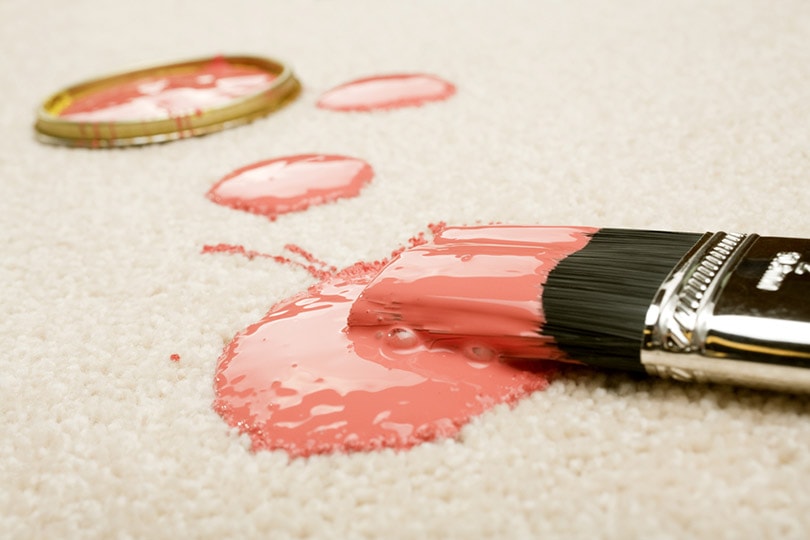
2. Dry Blot the Stain
Blot the paint with dry paper towels or a clean cloth. Again, blot gently from the outer edge and work toward the center to contain the stain.
Use a fresh section of the towel with every few blots but be careful not to transfer paint from the paper towel to a clean part of the carpet. Do not rub or scrub the stain because it will spread and work deeper into the carpet fibers, making it harder to remove.
3. Spray the Stain with Water and Dish Soap
Fill a spray bottle with water and add 3–4 drops of mild dish liquid. Shake it gently to mix. Spray the stain until it’s well-saturated.
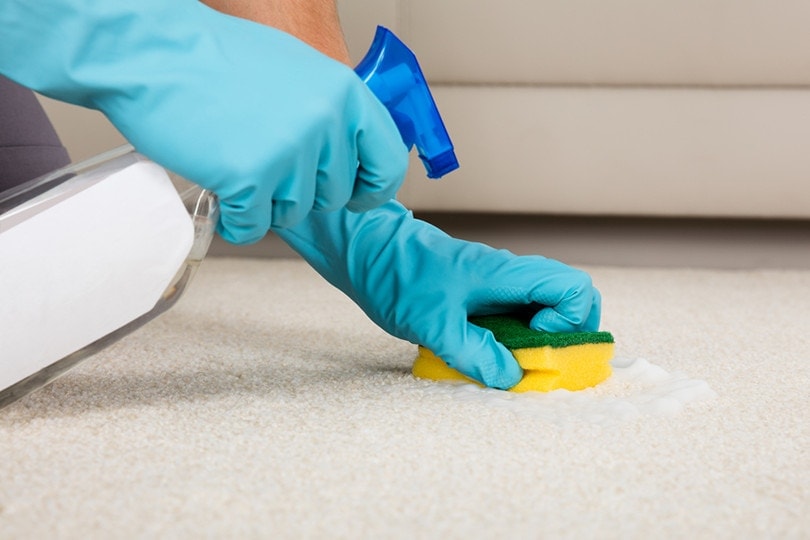
4. Blot the Wet Stain
Blot the wet stain with a paper towel or cloth to pull up the paint. Continue doing so until the area is dry and the mark is gone, changing out the towel as needed.
Alternative Cleaning Solutions for Wet Acrylic Paint
If you don’t have dish liquid on hand (or if it isn’t removing all of the paint), you can try a white vinegar solution instead. In a spray bottle, mix vinegar with water at a 1:10 ratio. Spray it on the stain and blot it up as you did in steps 3–4. Follow up with a cold water rinse and dry with paper towels.
How to Clean Dried Acrylic Paint
Dried acrylic paint is much more difficult to clean than wet paint, and you’ll usually need to rely on more heavy-duty cleaning solutions than soap and water. To give you some perspective on cleaning it, let’s look at what is in acrylic paint.
At its most basic, acrylic paint contains pigment particles, a polymer containing the pigment, and a solvent that allows the polymer to be spread around. In this case, the solvent is water. Once the water dries, through either evaporation or absorption into the supporting material, the polymer is left as a thin, solid film on the surface.
It’s akin to how nail polish works, albeit with a different solvent, and you can remove the two in similar ways. Acetone and rubbing alcohol, for instance, dissolve the polymer chains in dried acrylic paint, allowing them to lift set-in stains.
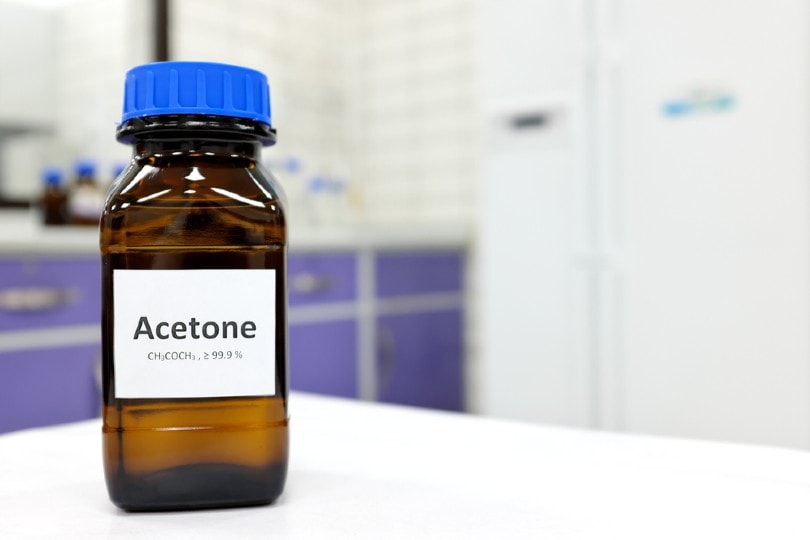
Why You Should Use Rubbing Alcohol
Unfortunately, although it can remove acrylic, acetone will also discolor and damage carpet fibers in many cases. By contrast, rubbing alcohol is perfectly safe on nearly all types of carpet, so it’s the best place to start when you need to remove dried acrylic paint.
- Butter knife or similar scraper
- Pliers
- Rubbing alcohol
- Paper towels or a clean cloth
1. Remove Dried Pieces of Paint
Using a butter knife, putty scraper, or pliers, gently remove as much of the dried paint as possible without damaging the carpet fibers. You may also be able to trim stained strands at the end with a pair of scissors.
2. Apply Rubbing Alcohol to the Stain
Pour rubbing alcohol onto a paper towel or clean cloth and blot it on the stain to dampen it. Let the rubbing alcohol sit for 10–20 minutes to break down the paint.
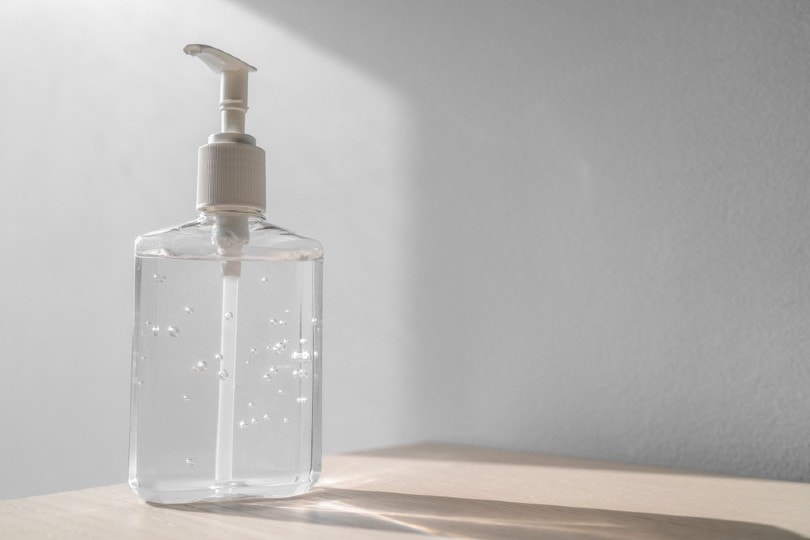
3. Blot the Rubbing Alcohol
After several minutes have passed, blot the stain with another cloth until it is gone. You can use a toothbrush at this point to lightly scrub and dislodge stubborn pieces of paint, taking care not to pull or fray the carpet fibers.
Rubbing Alcohol Alternatives
If you’re all out of rubbing alcohol, you can try hand sanitizer instead. Since most hand sanitizer contains alcohol, it makes a handy hack for cleaning paint in the same way.
Apply the hand sanitizer to the stain and gently work it in with your cloth. After several minutes, use a damp cloth to remove the hand sanitizer. Follow up with another cloth to dry the area.
Can You Use Acetone to Remove Acrylic Paint from Carpet?
Acetone and nail polish remover can efficiently remove acrylic paint, but you should only use them as a last resort. These substances can strip the color from carpet and degrade the fibers, making them look drabby and worn.
If you want to try using acetone to remove acrylic paint from your carpet, spot test it in an inconspicuous area, letting it sit for a few minutes before blotting it up to see if it leaves a stain.
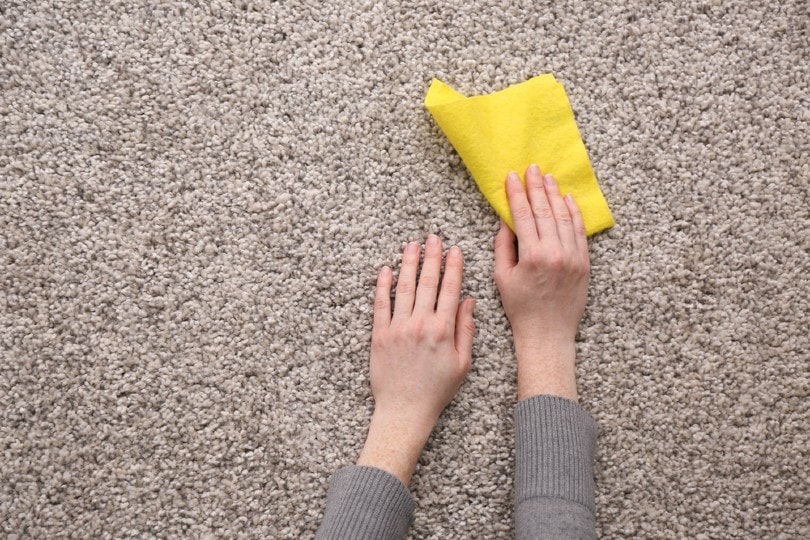
Final Thoughts
Acrylic paint is a vibrant and fun medium for children to explore their artistic side, and you shouldn’t let the threat of a tiny stain stand in their way. The crucial point to remember is that acrylic stains are easiest to clean out of a carpet when they’re wet. Stay aware and responsible while using acrylic paint and start cleaning up accidents as soon as they happen. With these simple household solutions, you can make quick work of removing paint and preserving the look of your carpet.
Featured Image Credit: McKinleys, Shutterstock
Contents


